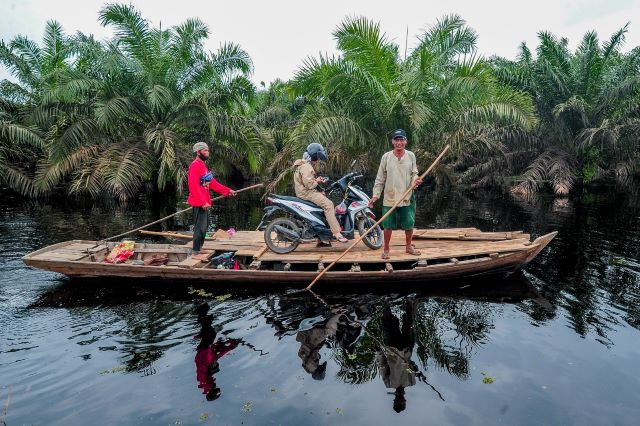Popular Reads
Top Results
Can't find what you're looking for?
View all search resultsPopular Reads
Top Results
Can't find what you're looking for?
View all search resultsEU deforestation regulation seen to complicate RI biodiesel exports
Change text size
Gift Premium Articles
to Anyone
T
he European Union’s deforestation regulation (EUDR) will make it harder for Indonesian biodiesel to enter the EU market, as well as that of other countries, experts believe.
Biodiesel output in Indonesia, the world’s third-largest producer, rose 11.3 percent to 13.15 million kiloliters (kl) in 2023, according to data from the Indonesian Biodiesel Producers Association (APROBI).
Exports, however, plummeted almost 50 percent to just 187,810 kl in 2023 from 371,000 kl in the preceding year. In January of this year, biodiesel exports sank about 73 percent month-to-month (mtm) to just 5,746 kl.
APROBI secretary-general Ernest Gunawan expected the regulation, once enforced, to further reduce biodiesel exports, though he declined to provide an estimate of the impact.
“We will continue to collaborate with the government [...] to address the EUDR problem. Apart from that, we will focus on the domestic distribution of fatty acid methyl ester [FAME],” he told The Jakarta Post on Wednesday.
On Feb. 2, the US Foreign Agricultural Service revised down its estimate for Indonesian palm oil exports in marketing year 2023/24 to 27.9 million tonnes on the assumption of lower supply, higher domestic use and reduced export demand.
The agency also revised down its projection for the use of palm oil in Indonesia’s biodiesel industry to 12.3 million tonnes for 2023/24 on lower-than-expected biodiesel distribution in 2023.
Read also: EU deforestation regulation may put RI rubber industry in jeopardy
Energy and Mineral Resources Ministry’s acting renewables director general Jisman Hutajulu attributed the decline in Indonesian biodiesel exports to EU trade protectionism against Indonesian biofuel products, with “the latest [case in point] being the EUDR”.
“All these challenges have led to Indonesian biodiesel exports declining by up to 70 percent,” he said on Feb. 27, as reported by Bisnis.
Nevertheless, the ministry’s bioenergy director, Edi Wibowo, expressed optimism that this year’s exports would beat last year’s.
“Perhaps [biodiesel] exports will slightly increase this year. Last year, we exported around 300,000 kl, maybe this year we will export 300,000 to 400,000 kl,” he said during a seminar hosted by the APROBI on Feb. 27, as reported by Katadata.
He went on to say that the EUDR policy would make exported Indonesian biodiesel, especially that produced from palm oil, subject to additional taxes of around 15-20 percent.
This would hurt the competitiveness of Indonesian palm oil derivative products and explained the 70 percent decline in biodiesel exports, he added, likely referring to the drop in January.
Edi noted, however, that the government was prioritizing domestic utilization rather than exports of Indonesian biodiesel products.
The EU representation in Jakarta has denied that the EUDR could hurt Indonesian shipments to the EU. "I would like to underline that biofuels are not in the scope of the EU deforestation regulation," Henriette Faergemann, first counsellor for environment, climate action and ICT at the EU Delegation to Indonesia, explained to the Post on March 15.
Jakarta increased the mandatory percentage of palm oil-based biodiesel in its gas oil supply to 35 percent in February last year, up from the earlier 30 percent mandate in place since 2020.
The mandate, widely known as B35, was implemented nationwide in August.
The energy ministry has raised its target for palm oil-based B35 biodiesel to 13.41 million kl for 2024, up around 2 percent from last year's 13.15 million kl. The government provides incentives to help biodiesel producers reach the annual targets.
Ahmad Rahma Wardhana, a researcher at Gadjah Mada University’s Center of Energy Studies (PSE UGM), said industry players were expecting Indonesian palm oil exports to decline as the government pushed for more domestic use of biodiesel.
To support exports, he recommended adjustments to the sustainability certification of Indonesian palm oil. “This is an opportunity for Indonesia to synchronize the Roundtable on Sustainable Palm Oil [RSPO] and EUDR standards,” he told the Post on Wednesday.
Read also: Energy ministry increases biodiesel quota for 2024
Muhammad Osribillal, an industry and regional analyst at Bank Mandiri, said that even though more than 50 percent of Indonesian biodiesel exports went to China, some of those products may then be exported from China to EU countries.
“If this is the case, [the EUDR] could cause a significant decline in Indonesian biodiesel exports,” he told the Post on Tuesday.
Nevertheless, he expected the regulation to have minimal impact on Indonesia’s biodiesel industry as a whole, considering that it relied so heavily on domestic consumption.
“The EUDR implementation remains unclear for businesses because it will only be effective in early 2025. The government must take measures to protect the plantation industry, especially smallholders, from getting [negatively impacted] by the regulation,” Osribillal said.
If the EUDR principles were to be accepted across the global market, all stakeholders would have no choice but to adapt and put in extra effort to comply with the policy, he added.
Editor's note: This story has been amended to include a response from the EU Delegation to Indonesia.









